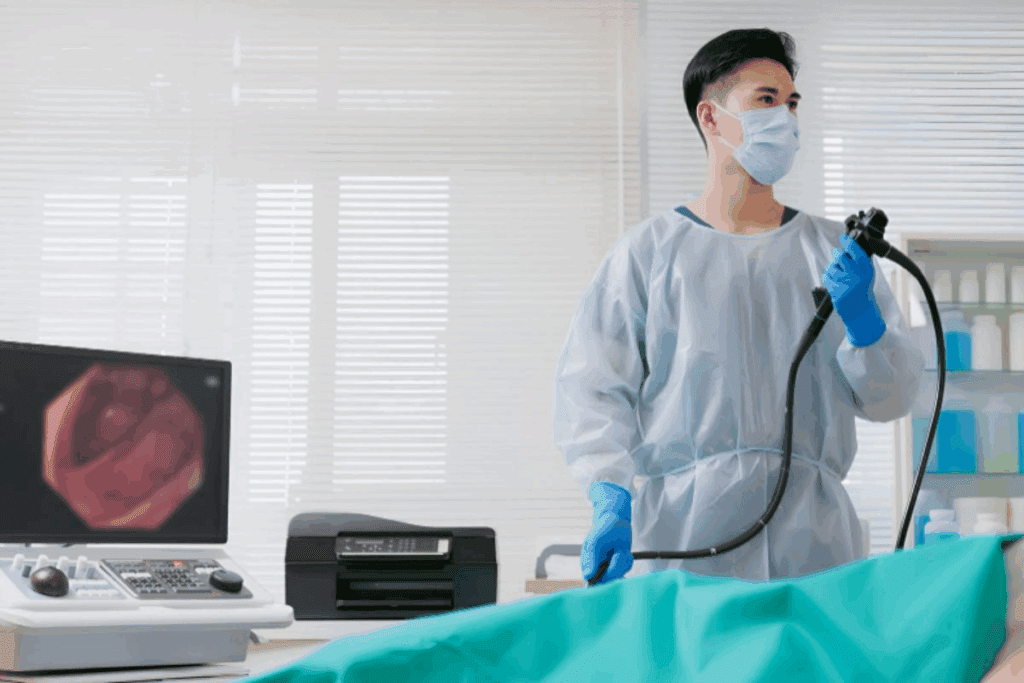
Understanding the recovery process after colon cancer surgery is key. It helps patients know what to expect and make lifestyle changes.What is the recovery time after colon cancer surgery? Get 7 key facts you need to know about healing and getting back to normal.
At Liv Hospital, patients get advice on their recovery journey. The time in the hospital and overall recovery time can change a lot. This depends on the surgery type and the patient’s health.
Patients usually spend a few days in the hospital and weeks or months at home. Mountain View Surgical Associates says laparoscopic colon surgery patients stay 3-5 days. Traditional open surgeries need 5-7 days.
Key Takeaways
- Hospital stay varies from 3 to 7 days depending on the surgery type.
- Laparoscopic surgery generally has a shorter recovery period.
- Full recovery can take several weeks to a few months.
- Patient’s overall health affects the recovery time.
- Liv Hospital provides patient-centered care for optimal recovery.
The Basics of Colon Cancer Surgery Recovery

Knowing how to recover after colon cancer surgery is key for patients. This surgery is a big step in fighting the disease. The recovery time depends on several important factors.
The surgery type greatly affects how long it takes to recover. There are mainly two types: laparoscopic and open surgery. Laparoscopic surgery is less invasive, leading to shorter hospital stays and quicker recovery times.
Types of Surgical Procedures for Colon Cancer
There are different ways to perform colon cancer surgery. The choice depends on the cancer’s stage, location, and the patient’s health. The two main types are:
- Laparoscopic surgery: A minimally invasive procedure that involves smaller incisions, leading to less tissue damage and trauma.
- Open surgery: A traditional method involving a larger incision to access the colon directly.
The decision between these procedures is based on several factors. Minimally invasive procedures are often chosen when possible. They offer benefits like shorter recovery times and fewer complications.
Factors That Influence Recovery Time
Several factors affect how long it takes to recover from colon cancer surgery. These include:
| Factor | Description | Impact on Recovery |
| Type of Surgery | Laparoscopic or Open | Laparoscopic surgery generally results in faster recovery |
| Overall Health | Presence of comorbidities | Patients with fewer comorbidities tend to recover faster |
| Age | Patient’s age | Older patients may have longer recovery times |
A medical expert says, “The recovery time after colon cancer surgery can vary a lot. It depends on the surgery type and the patient’s health.” Knowing these factors helps plan the recovery better.
Recovery after bowel cancer surgery is usually quicker with minimally invasive procedures. This means faster bowel function return and lower infection risk. Choosing the right surgery technique is very important for each patient’s needs.
Recovery Time After Colon Cancer Surgery: What to Expect

After colon cancer surgery, patients often wonder about their recovery. The recovery process is key and needs careful watching and care.
Hospital Stay Duration
Patients start their recovery in the hospital. Here, they are watched for health and any issues. Memorial Sloan Kettering Cancer Center (MSK) says patients usually stay 3 to 7 days.
Doctors check on pain, bowel function, and comfort during this time. The hospital stay helps manage any problems right away.
Full Recovery Timeline
Recovery doesn’t stop when you leave the hospital. Most people need two to three months to get back to normal.
How long it takes can depend on the surgery type, health, and any complications. Each case is different.
| Recovery Stage | Typical Duration | Key Focus |
| Hospital Stay | 3-7 Days | Pain management, monitoring bowel function, managing post-operative complications |
| Initial Recovery at Home | 2-3 Weeks | Rest, dietary adjustments, gradual return to normal activities |
| Full Recovery | 2-3 Months | Regaining strength, returning to normal bowel function, resuming pre-surgery activities |
Knowing the recovery timeline helps patients plan better. It sets realistic goals for their recovery.
Minimally Invasive vs. Traditional Surgical Approaches
There are two ways to do colon cancer surgery: minimally invasive and traditional open surgery. Each has its own benefits and how you recover. The choice depends on how far the cancer has spread and your health.
Benefits of Minimally Invasive Procedures
Laparoscopic surgery is a minimally invasive method. It uses smaller cuts, causing less tissue damage and lowering the chance of problems. Studies show it leads to less pain and quicker recovery than open surgery.
Here are the main benefits of minimally invasive surgery:
- Smaller cuts mean less scarring
- Lower risk of infections and other issues
- Less pain after surgery
- Return to normal life sooner
Recovery Differences Between Surgical Approaches
Recovery times vary a lot between the two methods. People who have minimally invasive surgery usually stay in the hospital less and heal faster. Open surgery, on the other hand, means longer hospital stays and longer recovery times.
Here’s how recovery times compare:
| Recovery Aspect | Minimally Invasive Surgery | Traditional Open Surgery |
| Hospital Stay | 2-3 days | 5-7 days |
| Recovery Time | 2-3 weeks | 6-8 weeks |
| Pain Level | Less pain | More pain |
Knowing these differences helps patients plan better and choose the right surgery for them.
How Cancer Stage Affects Your Recovery Journey
The stage of colon cancer at diagnosis greatly affects recovery. Early-stage colon cancer patients usually have an easier time recovering. This is different from those with advanced-stage cancer.
Knowing how cancer stage impacts recovery helps patients and caregivers prepare. It’s important to understand this before starting the recovery journey.
Stage 1 Colon Cancer Surgery Recovery
Patients with stage 1 colon cancer often have simpler surgeries. Their recovery is usually faster. Stage 1 colon cancer surgery recovery might not even need a colostomy bag.
The body heals quickly, with fewer complications. This makes the recovery smoother.
Recovery Considerations for Advanced Stages
Advanced colon cancer patients face a tougher recovery. Their surgeries are more complex. They might also need chemotherapy or radiation therapy.
This makes recovery longer and riskier. It’s key for patients and doctors to talk about what to expect. This helps plan the right support and care during recovery.
What Stage of Colon Cancer Requires a Colostomy Bag?
Knowing if you need a colostomy bag after colon cancer surgery depends on several factors. The cancer’s stage is a big one.
A colostomy bag might be needed for those with advanced colon cancer or tumors near the rectum. The choice to have a colostomy depends on your health and how far the cancer has spread.
Temporary vs. Permanent Colostomy
Whether you need a colostomy bag for a short time or forever depends on your surgery and health.
- A temporary colostomy is used to help the colon heal after surgery. It’s usually removable.
- A permanent colostomy is needed when the tumor is close to the anus or a big part of the rectum must be removed.
Living Without a Colostomy: When Is It Possible?
Many surgeons try to do colon cancer surgery without a colostomy. This depends on the tumor’s location, size, and stage.
New surgical methods and minimally invasive procedures help keep bowel function normal. This means you might not need a colostomy bag.
Talk to your doctor about your situation. They can tell you if you might need a colostomy. This helps you know what to expect during your recovery.
The Physical Recovery Process: Week by Week
The journey to recovery after colon cancer surgery takes weeks to months. Knowing each stage helps patients plan and stick to their care plan.
First Two Weeks: Initial Healing
In the first two weeks, the body starts to heal. Patients might feel tired, in pain, and uncomfortable. It’s important to rest and follow the pain management plan given by doctors.
Key aspects of the first two weeks include:
- Resting to allow the body to heal
- Managing pain effectively
- Monitoring for any signs of complications
Weeks 3-6: Building Strength and Mobility
By weeks 3-6, patients start to feel more energetic. They begin to regain strength and mobility. It’s important to slowly increase physical activity, as advised by healthcare professionals.
Some strategies for building strength and mobility include:
- Engaging in gentle exercises like walking or stretching
- Gradually increasing the intensity and duration of physical activities
- Participating in physical therapy if recommended
Months 2-3: Approaching Full Recovery
By months 2-3, many patients are close to full recovery. They may start to do normal activities again, like going back to work and hobbies. But, it’s important to keep following the doctor’s advice.
| Recovery Stage | Key Activities | Expected Outcomes |
| First Two Weeks | Rest, pain management, monitoring for complications | Initial healing, reduction in pain |
| Weeks 3-6 | Gentle exercises, gradual increase in physical activity | Increased strength and mobility |
| Months 2-3 | Resuming normal activities, continued physical therapy if needed | Approaching full recovery, return to normal life |
Returning to Normal Bowel Function After Surgery
Recovering from colon cancer surgery means making changes to how your body works. These changes can be managed with the right care. As you heal, your bowel habits may change, but they usually get better over time.
Timeline for Bowel Function Restoration
How long it takes to get back to normal can vary. But most people start to see improvements a few weeks to months after surgery. It’s important to be patient and follow your doctor’s advice during this time.
Key Milestones in Bowel Function Recovery:
- Right after surgery: Bowel movements might be slow because of anesthesia and surgery.
- First few weeks: Bowel movements start to come back, but they might be different.
- 1-3 months: Most people see a big improvement in their bowel habits. Some might have occasional issues.
Dietary Considerations During Recovery
Your diet is key in managing bowel function after surgery. Eating foods high in fiber can help keep bowel movements regular. This can also lower the chance of getting constipated or having diarrhea.
Nutritional Tips for Recovery:
| Nutritional Element | Benefit | Food Sources |
| Fiber | Regulates bowel movements | Whole grains, fruits, vegetables |
| Hydration | Softens stool, aids digestion | Water, clear broths |
| Probiotics | Supports gut health | Yogurt, fermented foods |
Knowing when bowel function will get back to normal and making smart food choices can help you through your recovery. This is after colon cancer surgery.
Managing Pain and Discomfort During Recovery
Managing pain and discomfort is key after colon cancer surgery. It helps patients feel better and get back to normal faster.
Pain Management Strategies
There are many ways to handle pain and discomfort. Here are a few:
- Medication: Doctors often give pain meds to help. It’s important to take them as directed.
- Rest: Resting helps your body heal and can lessen pain.
- Physical Therapy: Gentle exercises and therapy can improve movement and reduce pain.
- Relaxation Techniques: Deep breathing, meditation, and guided imagery can help manage pain and stress.
Keeping a pain diary is also helpful. It tracks your pain and how well your strategies work. This helps doctors adjust your treatment if needed.
When to Seek Medical Attention
Some pain is normal after surgery. But, there are times when you need to see a doctor. Look for these signs:
- Severe pain: Pain that doesn’t get better with meds or gets worse.
- Signs of infection: Fever, redness, swelling, or discharge from the surgery area.
- Unusual symptoms: Trouble urinating, severe nausea or vomiting, or bleeding.
Knowing when to get help is important for a safe recovery.
Potential Complications and How to Address Them
Knowing about possible complications after colon cancer surgery is key for a smooth recovery. While surgery is usually safe, knowing the risks helps patients take steps to avoid them.
Common Post-Surgical Complications
Several complications can happen after colon cancer surgery. These include:
- Infection: Bacterial infections can occur at the surgical site or within the abdomen.
- Bowel Obstruction: The intestine can become blocked, leading to severe abdominal pain and constipation.
- Adhesions: Bands of fibrous tissue can form between abdominal organs or between organs and the abdominal wall.
- Leakage: In some cases, the connection between the remaining parts of the colon can leak, leading to infection.
Knowing about these complications helps patients watch their health closely. They should seek medical help if they notice any concerning symptoms.
Reducing Risk of Infection and Other Issues
To lower the risk of complications, patients should follow their post-operative care plan. This includes:
- Following Dietary Guidelines: A specific diet may be recommended to ease digestion and prevent bowel obstruction.
- Monitoring for Signs of Infection: Patients should watch for fever, redness, or swelling at the surgical site.
- Attending Follow-Up Appointments: Regular check-ups with healthcare providers can help identify any issues early.
- Maintaining Good Hygiene: Keeping the surgical site clean can reduce the risk of infection.
By following these steps, patients can greatly reduce their risk of complications. This helps them recover more smoothly.
Emotional and Psychological Aspects of Recovery
After colon cancer surgery, patients face many emotional and psychological challenges. These can affect their personal life and overall health. It’s a tough time for many.
Recovering emotionally after surgery is key to healing. Patients might feel anxious, depressed, or worried about the future. It’s important to recognize these feelings and seek help when needed.
Coping with Body Image Changes
Body image changes can be a big emotional hurdle. This might include adjusting to a colostomy bag or dealing with scars. These changes can hurt a person’s self-esteem and confidence.
Support from healthcare professionals, family, and friends is vital. Connecting with others who have gone through similar experiences can also help a lot.
Support Resources for Cancer Survivors
It’s important for cancer survivors to have access to support resources. These can include counseling, support groups, and online communities.
Using these resources can help a lot in coping with the diagnosis and treatment. Family members and caregivers also need support, as they play a big role in the patient’s recovery.
Here are some recommended support resources:
- Cancer support groups, either in-person or online
- Counseling services with a therapist experienced in oncology
- Online forums and communities for cancer survivors
- Educational resources and workshops on managing emotional and psychological challenges
By acknowledging the emotional and psychological aspects of recovery and using available support, patients can better heal and improve their well-being.
Conclusion: Navigating Your Colon Cancer Recovery Journey
Recovering from colon cancer surgery is a complex process. It needs a full approach, covering physical, emotional, and psychological needs. Knowing what to expect helps patients navigate their journey better.
Being aware of the factors that affect recovery is key. Patients who know about their recovery can actively participate in their healing. This leads to a smoother and more successful recovery.
As patients move forward, focusing on their overall well-being is essential. Using supportive resources and care teams helps in a successful recovery journey.
FAQ
What is the typical recovery time after colon cancer surgery?
Recovery time varies based on the surgery type, patient health, and cancer stage. Patients usually spend several days in the hospital and weeks or months at home recovering.
How long do I need to stay in the hospital after colon cancer surgery?
Hospital stay is usually 2-7 days. During this time, the healthcare team watches over you and handles any complications.
What are the benefits of minimally invasive colon cancer surgery?
Minimally invasive surgeries, like laparoscopic, have smaller cuts, less pain, and quicker healing.
Will I need a colostomy bag after colon cancer surgery?
Some patients with colon cancer may need a colostomy bag, mainly those with advanced disease or tumors near the rectum. The decision is made on a case-by-case basis.
How long does it take to recover from colon cancer surgery?
Recovery can take 2-3 months. During this time, following a specific diet and activity plan is important for a smooth recovery.
What can I expect during the physical recovery process after colon cancer surgery?
Physical recovery is gradual. Patients experience different levels of recovery at each stage. Knowing what to expect helps manage expectations and follow the care plan.
How can I manage pain and discomfort during recovery?
Use pain medication and make lifestyle changes to manage symptoms and aid in recovery.
What are the possible complications after colon cancer surgery?
While surgery is safe, complications like infection, diarrhea, or constipation can occur. Understanding these risks and taking steps to prevent them helps in a smooth recovery.
How can I cope with emotional and psychological changes during recovery?
Emotional and psychological changes are common. Access to supportive resources helps cope with these changes and aids in recovery.
What dietary considerations should I keep in mind during recovery?
Dietary adjustments help manage bowel function changes and aid in returning to normal bowel habits. Follow a diet plan recommended by your healthcare team.
Can I recover from colon cancer surgery without a colostomy bag?
Yes, some patients can recover without a colostomy bag, depending on the disease extent and tumor location.
How does the stage of colon cancer affect my recovery journey?
The cancer stage is key in determining surgery extent and recovery. Early-stage cancer patients generally have a better prognosis and fewer complications than those with advanced-stage cancer.
References:
Irani, J. L., et al. (2022). Clinical practice guidelines for enhanced recovery after surgery in colorectal procedures. Journal of Colorectal Surgery. https://pmc.ncbi.nlm.nih.gov/articles/PMC9839829/









